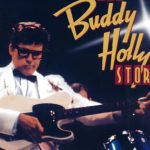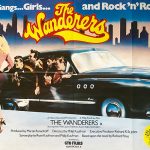I prefer not to watch biographical films about Elvis. For many reasons, but the most important of them is that the life of such a famous person as Presley, willy-nilly, becomes shrouded in all sorts of gossip and legends. And the devil knows what the next director will decide to take pictures about the King. The topic is still very fruitful. So I prefer biographies to frank trash like Bubba Ho-Tep. Yes, there’s Elvis and the Negro Kennedy engaged in an unequal battle against an ancient Egyptian mummy, but at least no one is trying to sell you this as an official biography. And the King, by the way, is played there by Bruce Campbell himself – a seasoned fighter with evil spirits of all sorts.

But I still decided to watch the movie Elvis ’79. First of all, it was filmed by John fucking Carpenter! Yes, yes, the one who gave us Something, Christina, Strangers Among Us and a dozen awesome horror movies, thrillers and action movies. And Elvis Presley is played by Kurt Russell himself! Isn’t it cool? It turned out that it was on the set of Elvis that Russell and Carpenter worked together for the first time – and, as history has shown, these cats worked one hundred percent, and subsequently this duo will give us a first-class movie more than once. In addition, Kurt knew the King personally: Russell’s debut took place in the film It Happened At the World’s Fair, starring Presley. Yes, Kurt’s role was very episodic, and at that time he was only about eleven years old, but in at least one interview Russell recalled Elvis as “a wonderful guy who doesn’t have his head in the clouds.” And this means that Kurt still has some personal memories and ideas about the King from that moment – and what could be more expensive for the main role in a biographical film than personal experience? Well, according to Carpenter, Russell “understands Elvis” – and all of the above only added to my confidence that this movie is worth watching.

On the other hand, I was never able to find out exactly how Kurt got into this project. A little more is known about Carpenter in this regard: according to the director himself, his Halloween movie was just released at that time, and the producers found out that the horror master himself wrote the music for the film. For some reason, this convinced them that Carpenter would cope with the film about Elvis Presley. It is said that this was the kind of work that “every director in the city refused,” but John agreed. Carpenter, who, by the way, is usually very stingy with sentiment, voiced the reasons for the agreement as follows:
“From my point of view, this is a personal film, because I really love Elvis, very much. I’ve always been a fan of his and… I loved his music. I have strong feelings for him and it means a lot to me. I’m very excited for the character, I’m very excited for the story, and in some ways I feel lucky to make an Elvis movie. It’s the kind of movie where I’m not going to feel like he’s using Elvis, but I’m going to feel like he’s trying to tell his story.”
And even 35 years later, in another interview, answering the question of why Carpenter agreed to make this movie, John will answer again: “I’ve always loved Elvis Presley.”
And not the last fact is the release date of the film: 1979. Less than two years have passed since Elvis’s death at the time of the film’s release. So this movie, if not the first biographical tape about the King, then certainly one of the first. Why is this important? Yes, because the life of Comrade Presley has not yet managed to turn into an excerpt from the collection of urban legends of the twentieth century. There were a lot of people who personally communicated with Elvis Presley, and therefore they didn’t just remember about the person – they knew him, and they knew firsthand. Which automatically puts John Carpenter’s film up a notch in my eyes.

I really hope that I have already aroused your interest and you already want to watch this movie. Nevertheless, I will set out my personal impressions of this movie below. This time there will be spoilers, if this concept is applicable to biographical cinema at all. So, let’s start with the actors. Kurt Russell – damn, he looks like Elvis. Just awesome. I don’t know how much makeup was used – the network only mentions that Carpenter glued Russell’s ears so they wouldn’t stick out too much -but as a result, Kurt turned out to be extremely similar to the King. Comrade Russell already had a lot of acting talent back then. The chemistry between him and Sison Hubley, who plays Priscilla Presley, was such that after the film they got married. However, apparently, after coming out of the images, they came to their senses and divorced four years later.

The role of Vernon Presley – Elvis’s father – was played by Kurt’s father Bing Russell – so there’s nothing to say. But the role of Gladys Presley – Elvis’s mother – went to Shelley Winters. This is a legendary actress who started acting in films back in the forties, and her career has gone through six decades. Despite all her awards and fame, I somehow managed to dodge all the films with Shelly’s participation, and Elvis became the first film in which I finally saw Winters on the screen. And how damn good she is! Carpenter clearly built his film mainly around the personality of Gladys Presley – and we’ll come back to that later – but not least thanks to Shelley’s acting after the death of her character, the emptiness that has appeared on the screen is almost physically felt. Winters is so good that there is more connection between her and Russell than Kurt has with his own father.

The rest of the roles, though mostly small, are still very memorable – again, not least because of the acting. That the staff of Sun Records, that the musicians in Elvis’s band, that his classmates – damn, even the blacks singing in the store. There were, like, three of them. And if I’m not mistaken, then this is a great example of how well the film is imprinted in memory, because I watched it like two months ago… So, I couldn’t stand it and watched that moment in the movie – it became interesting for me. So, there really were three Negroes and one white grandfather. So I was not mistaken, but, to be honest, I did not remember the white grandfather at all. What conclusions can be drawn?I have no idea.
But, in general, I switched to the quartet singing in the store in time. It’s time to talk about music! What’s an Elvis movie without the King’s songs, right? Well, here I have two pieces of news: good and bad. The bad news is that we won’t hear Kurt Russell. Apparently, although he looks like Presley outwardly, his voice still does not have the same qualities as the King’s voice. Very, very sorry. The good news is that Ronnie McDowell, who as a result sang all the Elvis songs, sings just fine, and after watching the movie you’ll probably want to pick up his covers in your collection. Here, however, is also not without a fly in the ointment: it is known that Ronnie recorded as many as 36 songs for Elvis, and only 25 tracks were used in the film itself. The remaining 11 tracks were never released, and five more were cut from the official soundtrack, plus out of four more, someone responsible for the record with the OST decided to make a kind of potpourri for some reason. Why – there is a great mystery. But still, the remaining twenty are really good. And from the movie itself, you can easily pick out Good Rockin’ Tonight, and in addition to Ronnie McDowell, Rufus Thomas Jr.’s Tiger Man song and a couple of other nice songs flash by, for which I’m not ready to vouch. In general, the soundtrack is decent, but you are unlikely to be able to listen to it separately from the film entirely. But, it seems to me, no one will be offended if I share what I have with you:
There are no complaints about the plot of the film, it’s simple… it may not be exactly what you expect. “Working on Elvis, I bring a lot of my feelings and what I feel about him,” Carpenter said. I don’t know how much influence Carpenter had on the script or the producers, but the film literally shows love for the King – it is felt in every frame. Maybe John wasn’t the only Elvis fan. Who knows, maybe the whole set was a Presley fan club. One way or another, you will see a minimum of negativity in this movie. You won’t see the fat King, you won’t see his health problems, you won’t see his conflicts with Colonel Tom, and you won’t see Elvis’s death either. The film ends in 1970 – just when Presley’s career took off again after a long break. And even the nervous breakdowns shown do not make much impression during viewing.

The biggest tragedy in this movie is the death of Elvis’s mother – and here it really feels. As I said before, not least because of the excellent performance of Shelly Winters. However, after Gladys leaves, everything else seems like a mere trifle. On the other hand, this is the only problem in the film. Otherwise, he captures and does not let go from the very first shots in which Elvis Presley personally shoots at the TV with a six-shooter. Thank you, John Carpenter! Where else can I see this?

Summing up: Elvis 1979 is one of the best films in my memory that were shot for television. On the same level as a Guy From California and definitely a step above all these modern TV shows and movies that all sorts of Netflix’s are shooting for themselves. I recommend watching this movie anyway – and preferably in the original voice acting. Well, if you attribute yourself to the fans and admirers of Elvis Presley and still haven’t seen this movie, then this is wrong. Just wrong. Fix it urgently.














